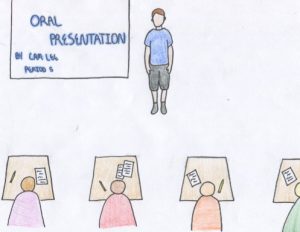
Everytime the teacher assigns their students to complete the anxiety-filling oral presentation, the class sighs throughout the room, but why do so many stress it when it is only one little part of life? Thirty seconds to five minutes, of an oral presentation in the big picture, won’t matter. When one looks back in time, recalling the exact moment when presenting their speech in front of the class will not occur. Adolescents at times can be dramatic and over worry themselves over small tasks, but oral presentations are not the biggest inconveniences, nor will it kill anyone. Instead, these presentations give a great sense of accomplishment in the moment.
Just like when someone plays a sport, the more they practice, the better they become. When completing the oral presentation, one builds stamina. Continuing to speak in public slowly builds up confidence and ability to feel comfortable speaking around others. Practicing and reciting what students will say builds the aim of oral presentations. One example is memory expansion which helps students retain the information learned. Overall, oral presentations are helping students gain the ability to easily public speak without feeling an overwhelming nervousness or encountering difficulty.
Additionally, oral presentations helps differentiate teaching styles. Students all learn differently, and instead of taking notes or listening to the teacher lecture on and on, speaking presentations give students an opportunity to learn in a more self-involving way. Oral presentations also give students who are exceptional at public speaking and presenting, such as speech and debate members, an opportunity to help show off their skills and passion.
Furthermore, speaking in front of a class now will help prepare one for later years. Fast forward a few years from now, students will be attending college or joining the workforce. Giving and preparing multiple oral presentations in class and communication are a huge part of college, and your grade. By enforcing this concept at a younger age, it is preparing them for higher education and careers. Whether it’s customer service, sales or pitching an idea to the boss, almost all jobs deal with some type of public speaking. Being able to have a voice is a prominent and somewhat necessary skill to have when living in a society based on the freedom of speech.
In the end, experiencing learning in a more active way is best. Oral presentations, although seeming like a waste of time and energy, can be undoubtedly beneficial. Students can evolve their comprehension and ability to speak with great confidence. To have a positive attitude about oral presentations will help a fair amount, understanding why speaking assessments are assigned to students are critical to having a practical viewpoint on oral presentations.
Con by Lorin AlukonisSchools require students to present an oral speech at one time or another, and the impact gives off more negative effects than positive. Mainly, the negative connotation of the projects is the idea of having a room full of peers watching every move that is made and focus on the words that come out of the mouth. The adrenaline rises and speeds through their bodies which results in their hearts pounding as if there was a mile-run. The fear of presenting is created by the concept of being judged by a large group of people and the feeling of intimidation.
Another downfall to oral presentation is the fact that students will do anything to not have to present it. Students may go to the restroom for extended periods of time or go to the nurse’s office to avoid the public humiliation. Sometimes fear builds up so much that students stay home all together or ditch that specific class. That three minute slideshow may seem like nothing for most, but for someone else it could be their entire world for a span of multiple days.
Judgement from adults and peers cause feelings of disconnection. It is comparable to people who dye their hair neon green, and some people will support them and others bring them down. However, students do not care about what is being said nor remember the presentation as time goes by. The belief that humans make of being stared down and humiliated does not exist but the brain convinces itself that it is true. The constant persuasion affects humans’ mentality because of the convincing ways. This leads to the presenters become more in their heads and anxious to give their speech.
Along with the anxiety that comes with being in front of an entire class, comes stuttering. When one messes up what they are saying, they become embarrassed and lose confidence all together. Everyone has experienced at some point that making nonsense could increase stress and become trapped into the mind even more. This gets the mind thinking that because one messed up they will receive a bad grade. All focus turns on the thought that all of the hard work went down the drain all because of the inability to speak in front of a class.
With everything piling up on their shoulders, one may become forgetful and become silent. Because of distractions, the train of thought is lost and there is confusion on where to continue from the current point. It is absolutely terrifying when others finally notice that there was an abrupt stop from speaking and are waiting for them to finish but they can’t. Situations become worse when anyone is alone. There is no one to back up or help begin from the place that the presentation stopped at. The grade is dependent on the presenter and only the presenter and it is their responsibility. Out of all the problems people may face during the speaking portion of the project, the worst position is continuing to stay in the thoughts in the head and let the mind wander away from the task at hand.
All of these factors make the idea of presenting in front of a class horrifying for those who get anxious easily and overthink simple tasks. Some factors may be more intense than others, but the phobia of speaking is present in all people and can follow into adulthood. Overall, public speaking brings more harm to those who use it rather than the uncommon positivity.










